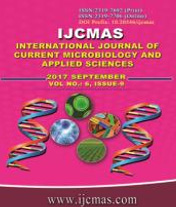


 National Academy of Agricultural Sciences (NAAS)
National Academy of Agricultural Sciences (NAAS)

|
PRINT ISSN : 2319-7692
Online ISSN : 2319-7706 Issues : 12 per year Publisher : Excellent Publishers Email : editorijcmas@gmail.com / submit@ijcmas.com Editor-in-chief: Dr.M.Prakash Index Copernicus ICV 2018: 95.39 NAAS RATING 2020: 5.38 |
A field investigation was conducted during 2004-2005 at Karanja Ramzanpur, village in Purna valley in Vidarbha region. The experimental was laid out in Randomized Block Design, consisting of seven treatments i.e. 100 % RD of NPK, 50 % RD of NPK, PSB 10 kg ha-1, crop residue @ 2 t ha-1 and alkali water irrigation passed through gypsum bed (30 cm thickness). The initial pHs, ECe, SAR and ESP representative soil varied from 8.51 to 8.40, 1.06 to 1.18, 15.17 to 9.22, 18.36 to 12.19 respectively. The results are present investigation revealed that alkali water irrigation passed through gypsum bed (30 cm thickness) improved the quality of water before irrigation by reducing RSC and SAR from 19.11 to 5.47 and 13.75 to 8.46. A significant highest total yield in both the crops were obtained as influenced by 100 % RD of NPK alone, followed by 50 % RD of NPK + PSB 10 kg ha-1 + crop residue @2 t ha-1 with alkali water irrigation passed through gypsum bed (30 cm thickness). In combination with the application of 50 % RD of NPK + PSB 10 kg ha-1 + crop @ 2 t ha-1 + alkali water irrigation passed through gypsum bed (30 cm thickness) improved physical properties of Sodic Haplusterts decreased bulk density, increase hydraulic conductivity, infiltration rate, maximum water holding capacity and % of water stable aggregate > 0.25 mm. The composition of NPK nutrients and its uptake by greengram-safflower significantly increased in both the crops received under treatment 100 % RD of NPK alone, followed by integrated 50 per cent RD of NPK + PSB 10 kg ha-1 + crop residue @ 2 t ha-1 + alkali water irrigation passed through gypsum bed (30 cm thickness).
 |
 |
 |
 |
 |